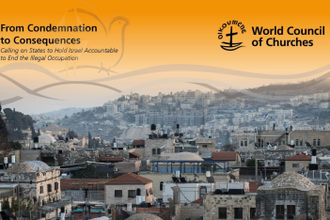Shalom - Reflection by Fr John Deehan

Image ICN/JS
Last Tuesday there was a rare breaking in of grace into the very bleak news we have been hearing from the Middle East.
I am referring to the moment when an old lady who had been held captive by Hamas since the outbreak of hostilities turned to one of the fighters, who would appear to have been one of her captors, and greeted him with the word Shalom which in Hebrew means peace, wellness and wholeness - a gesture which was totally unexpected in a situation where words expressing wounded pride, self justification and revenge predominate.
The lady certainly did not try to make light of her experience, indeed she described it as a journey into hell. Just imagine for a moment the initial journey, slung over the back of a motorbike and then being pushed around the labyrinth that is the underground tunnel system of Gaza, and then the days of waiting, not knowing one's fate, not knowing what might be happening to her elderly husband - and at the end of all that to have the will to say, Shalom.
That was not cheap sentiment. That one word came from a very different place than so many of the many words that have been expressed this week. She then went on to say that after she had been beaten at the start her captor - at least the one guarding her - had been kind. No doubt the cynics would judge him differently. Perhaps as Catholics we might describe her experience as a journey into purgatory. The difference between hell and purgatory is not that the people there may not have done very wicked things, but that there is still an opening for God's grace to permeate, there is still a possibility of repentance happening. The difference between purgatory and hell is that between hope and no hope.
I have no idea whether Yocheved Lifschitz was a religious or a secular Jew, but the same Old Testament Reading from the Book of Exodus that we hear today is as much part of Jewish heritage as it is of ours. It is a tiny example of that mix of narrative of the past and command for the present that was given the word Torah in Hebrew, which we inadequately translate as Law'. Torah gives us a deep insight into the nature of God and the way God expects his people to act when they enter the promised land. 'You must not molest the stranger or oppress him, says God, because you lived as strangers in the land of Egypt.' In other words, Look back at your own experience, and do not imitate your oppressors, because that is the way you remain inside the cycle of violence and oppression and can never break free of it. 'If you lend to a poor person, don't load your loan up with interest'. Israel's God speaks with a voice of compassion.
When Jesus is asked which is the greatest commandment of the Law he quotes two texts. The first was from another book of Torah/ the Law, the book of Deuteronomy (Dt 6:4ff). 'Listen Israel, the Lord our God is the One Lord. You shall love the Lord your God with all your soul and with all your strength'. It goes on to say, 'Do not forget the Lord who brought you out of Egypt, out of the house of slavery'. It was God who brought you out, who gave you the strength for the journey, not yourselves.
The second text was from the book of Leviticus - The starting point was the holiness, the otherness of God compared to his creatures. This holiness was something that Israel could aspire too, and so God goes on to say, You must not slander your own people, you must not hate your brother, you must not exact vengeance. In short, 'YOU MUST LOVE YOUR NEIGHBOUR AS YOURSELF. I AM THE LORD' (Lev 19:1-18).
In the Gospel Reading what the Pharisees were doing when the asked Jesus to pick out certain laws as greater than others was to practice idolatry. In the nations around them the gods would go to war among themselves, imitating the human condition of worshipping power for its own sake. Idolatry basically means adoring fake Gods who promise everything and deliver nothing. Jesus says in effect, 'You must be like the one God, be other and worship God by loving your neighbour'. The many laws are but commentary on this fundamental Torah /law which determines our ultimate happiness.
In the coming of Christ the whole of Torah/the Law is abbreviated, so to speak, into one person, the Son of the real, living God who came to show us what divine love looks like, out of that living Purgatory called the Cross, preferring to give up his life freely rather than follow the instincts of the pagan Gods with their pride and their lust for power. The alternative was love, even love for one's enemies.
Christians are called, in the words of St Paul, to imitate Jesus, to break with idolatry and become servants of the real, living God, and wait for Jesus to come from heaven. We all desire peace, but we know that peace can seem unattainable, or hard to attain but so easy to lose, that is why St Paul stresses both imitating Jesus now, while waiting in resilient hope for peace to be achieved through the working of God's grace in the world - a peace - shalom which made its breakthrough this week in the brief gesture of an old lady.
Fr John Deehan is Parish Priest at Our Lady Help of Christians, Kentish Town, north London. This was the text of the homly he gave yesterday. (Sunday 30A - 29 October 2023)


















